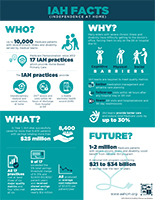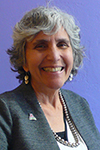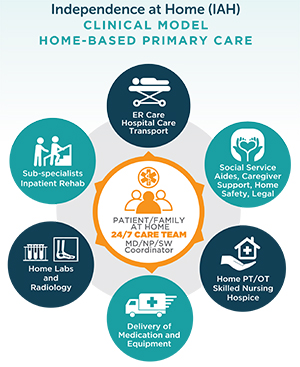 Mindy Fain, MD, president of the American Academy of Home Care Medicine, was quoted in the press releases of two U.S. senators and the academy on legislation introduced July 6, 2016, designed to make permanent Independence At Home (IAH), a federal pilot program begun last year that brings primary care medical services to Medicare beneficiaries with multiple chronic conditions.
Mindy Fain, MD, president of the American Academy of Home Care Medicine, was quoted in the press releases of two U.S. senators and the academy on legislation introduced July 6, 2016, designed to make permanent Independence At Home (IAH), a federal pilot program begun last year that brings primary care medical services to Medicare beneficiaries with multiple chronic conditions.
Click here or on image at right to view infographic.
 Dr. Fain, who also is a University of Arizona professor of medicine, chief of the UA Division of Geriatrics, General Internal Medicine and Palliative Medicine, co-director of the UA Center on Aging, and the Anne and Alden Hart Endowed Chair in Medicine, flew into Washington, DC, for the introduction of Senate Bill 3130 by Sens. Edward Markey (D-Mass.), John Cornyn (R-Texas), Michael Bennet (D-Colo.) and Rob Portman (R-Ohio).
Dr. Fain, who also is a University of Arizona professor of medicine, chief of the UA Division of Geriatrics, General Internal Medicine and Palliative Medicine, co-director of the UA Center on Aging, and the Anne and Alden Hart Endowed Chair in Medicine, flew into Washington, DC, for the introduction of Senate Bill 3130 by Sens. Edward Markey (D-Mass.), John Cornyn (R-Texas), Michael Bennet (D-Colo.) and Rob Portman (R-Ohio).
She noted that more than 100 organizations have lined up in support of the year-old pilot, which saved $25 million in its first 12 months—an average of more than $3,000 per participating beneficiary. About $13 million of those savings went to Medicare and the balance to IAH providers.
Representing the academy, Dr. Fain noted in releases put out by Sen. Markey and Sen. Bennet that “IAH successfully fills a critical gap in health care for our frail and elderly that few programs have been able to achieve.” She did not testify at the hearing to introduce the bill but was in the audience.
 Back in Tucson, she underscored the bipartisan and bicameral (House and Senate) support SB 3130 had garnered due to results from the pilot.
Back in Tucson, she underscored the bipartisan and bicameral (House and Senate) support SB 3130 had garnered due to results from the pilot.
“That’s unbelievable in this day and age,” Dr. Fain said. “This bill is sort of like mom and apple pie, though, and the savings—who’s going to be against house calls that save money for the country and improve care, right? It makes money, it’s high quality care and people in some of the studies actually live longer, too. So, there’s every reason to believe that it will be passed in the next year to 18 months.”
In her various roles at the University of Arizona and various organizations to which she belongs, Dr. Fain has always been a strong advocate for home-based medical care as both a more efficient model of care delivery and of greater benefit to home-bound patients and their families.
For a link to the actual legislation, click here. You can learn more about the program at the Centers for Medicare & Medicaid Services (CMS) website or read this fact sheet [PDF]. Track the legislation’s progress through the Senate here.

